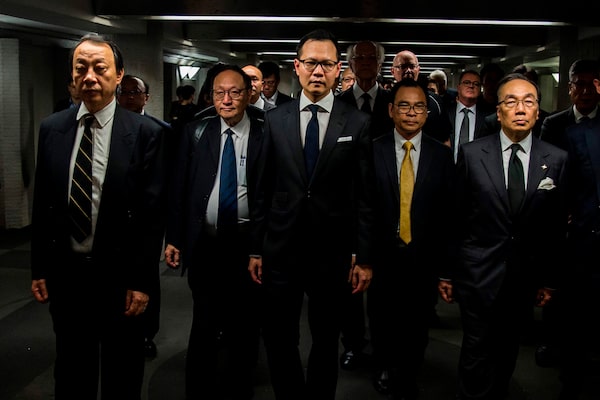
Pro-democracy lawmaker Dennis Kwok answers questions from the media outside the High Court in Hong Kong on Oct. 31, 2019.PHILIP FONG/AFP/Getty Images
A prominent Canadian-born Hong Kong dissident, one of eight pro-democracy activists targeted this week with cash bounties by the city’s Beijing-backed police force, is urging Canada to cancel its extradition agreement with the former British colony.
Dennis Kwok, born in Edmonton, was ousted from office as a legislator in Hong Kong in November, 2020, after he bucked against the Chinese Communist Party’s interventions in the territory that Beijing had originally pledged would have control over its own affairs for 50 years. He was one of four politicians removed from office for what China deemed as disloyalty to the regime.
Hong Kong Police announced on Monday arrest warrants and cash bounties worth $1-million Hong Kong dollars, or $168,800, for information leading to the arrest of eight prominent pro-democracy campaigners, including Mr. Kwok, who all live in self-imposed exile overseas. The list also includes Nathan Law, a former student leader and legislator.
Mr. Kwok and others fled after China’s crackdown on Hong Kong in 2020 when it imposed a national-security law on the former British colony. Ostensibly to target secession, subversion and terrorism, the law contains vaguely defined offences that critics say effectively criminalize dissent and opposition.
Canada suspended its extradition treaty with Hong Kong in July, 2020, citing the harsh national-security legislation. But it has not abrogated it.
“Scrap it,” Mr. Kwok, who now lives in the United States, advised in an interview.
He said it’s time for Canada and other Western countries to realize there is no returning to previously cordial relations with China. “People who think that things will go back to normal are kidding themselves.”
After bringing in the national-security legislation, authorities in Hong Kong conducted sweeping arrests of most of the city’s remaining opposition figures and activists. And in 2021, the People’s Congress in Beijing finalized an overhaul of Hong Kong’s electoral system that drastically curbed democratic representation in the city as authorities seek to ensure “patriots” rule the global financial hub.
Australia, the United States and Britain have already condemned the bounties issued by Hong Kong. On Tuesday, in response to a question from The Globe and Mail, the Canadian government criticized the arrest warrants without mentioning the bounties. The Department of Global Affairs did not, however, make any commitment to cancel the extradition treaty between Canada and Hong Kong, which remains suspended.
“Canada is gravely concerned by the issuance of arrest warrants by Hong Kong authorities for eight democracy activists around the world,” Charlotte MacLeod, a Global Affairs spokesperson, said in a statement.
“This extraterritorial application of the National Security Law further silences peaceful dissent and undermines protected rights and freedoms guaranteed under Hong Kong’s Basic Law,” she said.
“We continue to call on Hong Kong and Chinese central authorities to act in accordance with their legal obligations, to respect protected rights and freedoms and ensure the court system upholds the rule of law.”
About 300,000 Canadian citizens live in Hong Kong, which China originally promised would enjoy Western-style freedoms after its 1997 handover from Britain.

Mr. Kwok, centre, marches with colleagues to the Central Government Offices in Hong Kong on June 6, 2019, to protest against the government's plans to approve extraditions with mainland China, Taiwan and Macau.ISAAC LAWRENCE/AFP/Getty Images
Mr. Kwok said Western governments need to think carefully about what kind of partnerships they want to strike with China. “We’re just doing human-rights advocacy work. And they see that as a crime that endangers national security. And that could incur life imprisonment,” he said.
“What kind of a regime are we dealing with here?”
He noted that China’s recent targeting of him has come after he published a report on modern slavery and ensuring supply chains are free of the products of forced labour. “They see that as endangering national security and that shows what they really mean when they invoke national security,” he said.
A report prepared for Global Affairs last year said that, in Xinjiang, Beijing “is using otherwise legitimate programs for retraining and relocation of unemployed workers as instruments of a broader campaign of oppression, exploitation and indoctrination of the Uyghur Muslim population into Han Chinese culture.”
The report for Global Affairs said “nonvoluntary participation in retraining and relocation programs provides forced labour to the bottom of the supply chains for textiles and apparel, food products, and semi-conductor-based products, including solar panels.”
Margaret McCuaig-Johnston, former executive vice-president of the Natural Sciences and Engineering Research Council of Canada and now senior fellow at the Institute for Science, Society and Policy at the University of Ottawa, said Canada has no option but to condemn the bounties.
“Putting a dollar figure on the heads of people is barbaric. China does not follow the rule of law, and its attempt to impose such practices in other countries is unconscionable,” she said. “This is also a good time to cancel our extradition agreement with Hong Kong, which has been suspended since the National Security Law was introduced in 2020. We don’t have one with China and it is clear that Hong Kong is becoming just another city in China.”
Mr. Kwok said countries should be alarmed at the ambitious scope of Hong Kong’s national-security law that even applies to people in other countries.
U.S. State Department spokesman Matthew Miller cited this in a statement earlier this week, saying Washington condemns an “international bounty for information leading to the arrest of eight pro-democracy activists who no longer live in Hong Kong” and that the “extraterritorial application of the Beijing-imposed National Security Law is a dangerous precedent that threatens the human rights and fundamental freedoms of people all over the world.”
 Steven Chase
Steven Chase